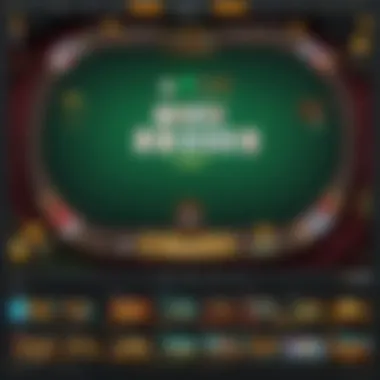Mastering Mucking in Poker: Strategies and Insights


Intro
In the fascinating world of poker, the act of mucking can sometimes feel like a secretive art form. For those not in the know, mucking refers to the process of throwing away unwanted cards rather than showing them to your opponents. It may seem simple, but there’s much more to it than meets the eye. Understanding mucking isn’t just about tossing cards aside; it’s entwined with strategy, psychology, and etiquette, all layered within the gameplay experience.
The common misconception is that mucking is only relevant to casual games. The reality is that it plays a pivotal role in shaping outcomes across various poker formats. Whether you’re diving into a game of Texas Hold'em at a crowded casino or navigating an online poker room, knowing when and how to muck can often be the difference between a well-played hand or an unfortunate misstep.
This guide dissects the intricacies of mucking, examining its impact on gameplay and strategic implications while considering the psychological aspects that drive player decisions. By exploring the nuances of mucking, from rounder’s etiquette to situational awareness and decision-making, we aim to equip both novice and seasoned players with critical insights to enhance their poker prowess.
As you delve into this comprehensive exploration, you’ll find not only tactical considerations but also the vital psychological layers that accompany each decision at the poker table. So, let’s shuffle the cards and stack the chips, and begin our journey into the art of mucking.
Prolusion to Mucking in Poker
Mucking in poker serves as an essential aspect of strategy, often overlooked by novice players yet wielding great significance in gameplay. Understanding mucking can provide a player with insights into not just their own actions but also those of their opponents. It encompasses a range of decisions that can shift the dynamics of a hand and influence overall outcomes. Whether you're folding a poor hand or choosing not to reveal your cards, mucking is about making choices that can serve your gameplay, and it often separates the amateurs from the experts.
Grasping the concept thoroughly sets the stage for higher-level strategic thinking. Given the competitive nature of poker, being able to effectively muck cards isn't merely a tactical decision; it's a psychological one as well. Players who smartly choose when to muck can throw their opponents off balance, increase frustration, or even spark overconfidence, leading to mistakes. The implications run deep, and mastering mucking enhances one's overall poker acumen while adding layers to both offense and defense in gameplay against adversaries.
It's not just about simply following rules—mucking also connects to historical contexts and evolving tactics. Knowing when and how to muck can often determine the outcome of crucial situations in games across various formats, whether in cash games, tournaments, or even friendly home games. The intricacies involved make mucking a topic worth diving into deeply, focusing on not only its execution but also the etiquette, psychological components, and strategic advantages it holds.
In the sections that follow, we will peel back the layers surrounding mucking, providing rich context and detailed insights. By the end of this exploration, players will gain a clearer understanding of how mucking can be wielded as a powerful tool in their poker repertoire.
The Mechanics of Mucking
Mucking in poker is not merely a reflex; it’s an orchestra of gestures and thoughts that looks simple but carries deeper meanings. The mechanics of mucking are pivotal, shaping not just individual hands but the very flow of the game. Understanding these details provides strategic advantages. When a player knows when and how to muck, they can maintain a crucial edge, protecting their chip stack and nurturing their psychological position at the table.
Physical Gestures and Actions
The way a player mucks their cards can say a lot about their state of mind. There’s a distinct language in the physical act of mucking. From the casual flick of the wrist to the more intentional covering of cards, these actions convey nuances that can influence the game. When players muck, it’s not just about getting rid of bad hands; it’s a message. A smooth, nonchalant muck might suggest confidence, whereas a frantic or sloppily executed gesture could raise eyebrows and stack suspicion.
Understanding these physical cues is essential. Players familiar with these mechanics can use them as tools for deception, disguising their true intentions while safeguarding their strategies. Moreover, the manner in which cards are mucked can also affect the flow of the game, allowing for natural transitions between hands without unnecessary delays.
Situations That Require Mucking
Folding Poor Hands
Folding poor hands is often seen as a necessity in poker, and it plays a crucial role in mitigating losses. The act itself is straightforward: you simply give up your cards, often without further questioning. However, folding should not be perceived merely as a knee-jerk reaction. Rather, it’s a strategic decision rooted in self-awareness.
The key characteristic of folding poor hands is the discipline it reflects. Choosing when to muck a hand can be the difference between fleeing from imminent defeat and steering your course towards future wins. Acknowledging when you hold a weak hand and folding it promptly can save you from sinking further in a losing battle, preserving both your chips and your mental focus.
Moreover, folding isn’t just a retreat; it can be seen as a tactical withdrawal. Much like how generals retreat to regroup, players who fold can return to fight another day, armed with better knowledge about their opponents and the dynamics in play. The unique feature here is the prevention of further damage, allowing players to reassess and reposition themselves strategically.
Choosing Not to Show Cards
Choosing not to show cards can also be a powerful strategic move. After mucking a hand, players might face the decision of whether to reveal what they folded, which can impact the psychological game. This choice is often characterized by a careful weighing of potential advantages against the information it might divulge to opponents.
This tactic serves multiple purposes. Firstly, not showing cards can create an air of mystery. Opponents may be left guessing about your play style, which can lead them to make erroneous reads or assumptions. Secondly, it allows players to maintain a modicum of control over the narrative at the table. Withholding information can render opponents hesitant or overly cautious in subsequent hands.
However, it’s essential to understand where this strategy lands. While it can boost your standing, it also has the potential to backfire. If players overuse this strategy, they risk becoming predictable. Thus, it’s a balancing act, one that requires keen perception and timing, which when executed correctly could bolster your standing at the table.
In sum, both folding poor hands and opting to not show cards reinforce the sophisticated nature of mucking, contributing to a broader game plan that requires foresight and adaptability. The mechanics behind these actions reveal the rich tapestry of strategy in poker, which goes far beyond the cards dealt at the table.


Strategic Implications of Mucking
Mucking in poker extends beyond simple hand management; it's a complex strategic maneuver that can significantly influence outcomes at the table. Skillful mucking informs an opponent's perception, dictates the flow of information in the game, and serves as a weapon for asserting dominance in a hand.
A well-timed muck can protect a player's overall strategy. By choosing to muck, a player can keep their opponents guessing, making it more challenging for them to determine betting patterns and hand strength. It simulates uncertainty, a crucial element in poker that might just tilt the odds in one’s favor. The importance of mucking lies not only in the action itself but also in the hesitations and decisions it spurs among other players.
Another factor to consider is the emotional layering that mucking introduces into gameplay. It plays a vital role in creating a narrative around a hand, allowing players to weave stories through their decisions. Hence, understanding its strategic implications can shift the balance of the game.
Mucking as a Strategic Tool
Mucking serves various strategic purposes, and savvy players recognize its value. First, it allows players to conserve chips in scenarios where their hand is unlikely to win. For example, consider a player that has been dealt a mediocre hand towards the end of a betting round. Mucking in this situation can prevent further losses, which is a prudent choice in the long run. Mucking can transform a potentially losing situation into a lesson learned for future hands.
Importantly, mucking can also act as a deterrent against aggressive play by others. It sends a clear message: ‘I won’t play just any hand, and I can fold if the stakes are too high.’ This tactic can dissuade opponents from recklessly betting since they know that you are capable of folding, maintaining their respect for your gameplay.
Psychological Elements of Mucking
Mucking doesn’t just involve logical calculations; it's deeply psychological as well. Players can leverage mucking to manipulate perceptions at the table.
Bluffing and Deception
A remarkable feature of bluffing lies in its psychological advantages. When a player decides to muck a hand that could have been played, they not only save their chips, but they simultaneously bait their opponent into the assumption that those cards were strong. This tactic hinges on deception. Many players might consider mucking as merely a defensive move; however, the offensive potential here is vast. By mucking strategically, a player can create a veneer of unpredictability that makes them a wild card, keeping opponents on their toes.
- Mucking to bluff has unique nuances, including:
- Establishing a false narrative about card strength.
- Manipulating opponent reactions, making them second guess their decisions.
Despite its advantages, the disadvantage of bluffing through mucking lies in its risk. An opponent who's perceptive might catch on and adjust their own actions accordingly.
Player Reads
Another compelling aspect of mucking relates to player reads, which greatly influence the game's psychological landscape. When a player chooses to muck a hand, savvy opponents can glean valuable insights into their style and tendencies. This action functions both as a reflection of confidence and a signal of vulnerability, which can be read accurately or misinterpreted.
- Understanding how mucking affects player reads highlights its complexity:
- Informs others about your willingness to fold.
- Potentially leads to misreads if the mucking is used inconsistently.
While effective player reads enhance strategic depth, they also come with the risk of overanalysis. Players can potentially tunnel vision, focusing so much on interpreting a muck that they neglect their own plays or even bluff opportunities.
In summary, mucking encompasses both a tactical and psychological spectrum, showcasing its significance in wider strategies of poker. As players grapple with the artful execution of mucking, they develop not just their hands, but their very understanding of the game itself.
Common Misconceptions about Mucking
Understanding the common misconceptions about mucking is essential for every poker player—be they a novice or a seasoned card shark. Many players approach mucking with a clouded perspective, often failing to grasp its true implications and strategic potential. Getting a clearer view of these misconceptions can arm players with better tactical decisions and sharper analytical skills, ultimately enhancing their overall game.
Mucking is Always Defensive
One of the most pervasive myths is that mucking is purely a defensive maneuver. While it’s true that mucking often occurs when a player realizes his hand can't win or when he chooses to protect a weaker position, thinking of mucking solely as a means of retreat oversimplifies its function.
In reality, mucking may serve a more versatile purpose. For instance, a savvy player might deliberately muck a strong hand in a situation where revealing it could risk giving away strategic advantages or changing opponent behavior. In these cases, mucking transforms into a proactive play rather than a mere defense strategy.


Consider a situation where you're in a tournament, and you have a promising hand but suspect your opponent is bluffing. Deciding to muck in that moment instead of revealing can create confusion about your playing style. It sends a message to your opponents, causing them to second-guess their reads on you, thus gaining an edge.
Using Mucking as an Advantage
Contrary to common belief, mucking can be a powerful tool to manipulate the flow of the game. Players often underestimate the strategic advantage that can be gleaned from intelligently deciding when to muck. It’s about wielding ambiguity while keeping your opponents on their toes.
Using mucking effectively can lead to a range of benefits:
- Creating Uncertainty: When you muck a strong hand, the uncertainty sown in your adversaries’ minds can lead them to make mistakes based on misjudgments about your playing style.
- Controlling the Narrative: Mucking helps dictate how the game unfolds. By holding some cards close to your chest, you can portray yourself differently at the table, perhaps as less of a threat or, conversely, build tension among players who are wary of your unknown strategy.
- Psychological Play: Mucking also grants players insight into their opponents’ psyches. If you know they react loudly to your folds or show signs of frustration, it becomes an opportunity for your next move. Their reaction can inform whether you choose to bluff, fold, or play conservatively.
The Role of Etiquette in Mucking
Understanding the role of etiquette in mucking during a poker game is as vital as knowing the rules of the game itself. It turns out that how you muck your cards can greatly influence your standing among players and the overall flow of the game. Etiquette effects not only your image as a player but also the dynamics at the table. Observing proper etiquette when mucking can build a sense of respect and camaraderie among players, crucial for an environment where strategy and psychology intertwine.
One core element of etiquette relates to communication. When a player chooses to muck, it is essential to be transparent about the decision, particularly in tournaments or when others may be affected by your actions. Ensuring that players are aware of your intention to muck not only showcases your sportsmanship but also maintains the integrity of the game. This is especially pertinent in a casino environment where tensions can run high.
The benefits of a well-managed muck extend beyond just personal conduct; it fosters a smooth game environment. If everyone follows agreed-upon etiquette for mucking, it minimizes disputes and misunderstandings. Such respect goes a long way in a community where trust is often a currency of its own.
Understanding Table Etiquette
Table etiquette manifests itself in various ways, all of which contribute to a positive poker experience. When it comes to mucking, a poker player should be keenly aware of the following practices:
- Timing: Always wait for your turn before mucking your cards. It’s disruptive to act prematurely, throwing off the rhythm of the turn sequence.
- Visible Actions: Make sure your actions are clear. Mucking should be done in a way that everyone can see. Hide nothing, as it creates suspicion or confusion among other players.
- Communication: If your hands are mucked, a simple gesture or nod can confirm your actions, letting others know that you're not in the hand anymore.
A Note on Cultural Differences
In poker, as in life, every culture has its unique nuances. Different poker communities may develop unwritten rules about mucking that are specific to the local setting. Being mindful of this allows players to adapt their approach based on their surroundings.
Consequences of Poor Mucking Practices
Ignoring proper mucking etiquette can lead to a variety of unfortunate outcomes, not just for the individual, but for the entire table. Poor practices include, but are not limited to:
- Disputes: Misunderstandings concerning a mucked hand can lead to arguments, which disrupt the flow of the game.
- Distrust: Players may become suspicious of each other's intentions, breeding an atmosphere of paranoia.
- Loss of Reputation: Constantly disregarding etiquette can label a player as rude or inconsiderate, which may ultimately affect how others interact with them at the table.
"In poker, as in life, respect is a currency that can go a long way. Practice proper etiquette and you might just find the game more enjoyable and profitable."
Mucking is more than just discarding bad cards; it’s about maintaining a standard of courtesy and respect that keeps the joy of the game alive. Keeping these elements in mind ensures that your poker experience will be enriching, not only for you but also for those playing alongside you.
Mucking Across Different Poker Formats
Understanding mucking in poker isn't just about the action itself; it’s crucial to recognize how it operates within the framework of various game formats. Each format has its unique characteristics, and the implications of mucking can vary significantly. By exploring mucking in different contexts—like cash games, tournaments, home games, and online play—we gain valuable insights into its strategic importance.
Cash Games vs. Tournaments
Cash games and tournaments stand out not only for their structure but also for the psychology involved. In cash games, players usually buy in for a certain amount of money, and the chips have direct cash value. This reality changes the mucking dynamic.
In cash games:
- Players might occasionally muck to conserve chips for more favorable situations.
- Mucking may also be employed to maintain a low profile or avoid giving reads to opponents about one’s tendencies.


Conversely, in tournaments:
- The stakes can shift dramatically based on the stage of the tournament.
- Mucking a hand during a critical juncture can conserve chips when facing an aggressive player, preserving valuable tournament life.
- The blind increases pressure, often prompting strategic mucking of borderline hands.
In essence, while both formats see mucking as a common practice, the motivations and contexts differ. A cash game player might find mucking a means of flexibility, while a tournament player must weigh the long-term ramifications of each decision.
Enhancing Decision-Making Through Mucking
Mucking isn't just a way to toss down unwanted cards; it plays a pivotal role in enhancing decision-making in poker. Understanding and executing mucking effectively can elevate a player’s strategy and give them a clearer picture of their gameplay dynamics. When examining this topic, it becomes imperative to look at various elements that contribute to informed decision-making, as well as the benefits and considerations involved. Knowledge about mucking can lead to significant advantages and improved play sessions.
Situational Awareness and Timing
Situational awareness is about being conscious of various factors at the poker table. This includes not only the cards in play but also player tendencies, betting patterns, and even your emotional state. Timing when to muck can turn the game on its head. For instance, if you've already invested chips in a pot but are dealt a subpar hand, the decision to muck should incorporate both the current table dynamics and your read on opponents.
A seasoned player might observe their opponents’ body language or betting behavior, deciding to muck as a way to disguise their strength. By doing so, they might avoid giving away any tells that could inform their rivals about their strategy or intentions. Paying close attention to the ebb and flow of the game allows a player to enhance their decision-making process significantly.
Here are some situational aspects to consider before mucking:
- Player Behavioral Signals: Are your opponents aggressive or passive?
- Betting Patterns: Has there been a sudden increase in bets that suggests strength?
- Your Chip Stack: Are you in a comfortable position or under pressure?
When to Muck: A Tactical Approach
Mucking should not be merely an act of relinquishing control but a meticulously calculated tactic. The decision to muck comes down to a nuanced understanding of one’s position relative to the entire game. A tactical approach to mucking allows players to strike a balance between showing strength and protecting their resources.
Consider these practical guidelines:
- Folding Poor Hands: Often the first instinct but think: Are you gaining any read by staying? Sometimes it is more beneficial to take the hit and observe rather than muck every poor hand.
- Choosing Not to Show Cards: There are moments when a strategic muck serves to keep opponents guessing. This adds an element of unpredictability; controllers dictate the flow of the game.
Ultimately, effective decision-making through mucking is about fine-tuning your approach to the game. Rather than viewing mucking as simply an act of quitting, see it as a tool for maintaining the upper hand, setting traps, or preserving resources.
"Strategically deciding when to muck can lead to revealing valuable information about your adversaries, which is an advantage few players fully utilize."
In sum, understanding the intricate nature of mucking isn’t just about discarding cards; it influences the very core of your strategy and decision-making at the poker table.
Finale: The Value of Mucking in Poker
In the world of poker, mucking is more than just a simple act of discarding cards; it serves as a crucial tactic that can significantly influence gameplay. By understanding the value of mucking, players can sharpen their decision-making skills and enhance their overall strategy. This concludes our exploration of mucking in poker, shedding light on its vital role.
Mucking allows players to maintain the element of surprise, which is a powerful tool at any poker table. Often, players tend to focus heavily on the cards being played rather than considering the impact of what is not shown. Knowing when to muck can prevent opponents from gaining insights into your strategy and can shift the power dynamics in your favor.
Moreover, effective mucking contributes to a player’s psychological edge. By concealing the true nature of one’s hand through selective discarding, it can create opportunities for bluffing or misdirection. This can lead to favorable outcomes, especially in high-stakes situations.
Recap of Key Points
Throughout this article, we discussed various dimensions of mucking:
- Mucking is a Strategic Tool: It is essential for maintaining secrecy in one’s gameplay.
- Psychological Aspects: The act of mucking involves critical player reads and bluffing techniques that can be utilized for personal gain.
- Etiquette Importance: Understanding how to muck appropriately plays a significant role in poker culture and the respect among players.
- Situational Awareness: Recognizing the optimal times to muck can greatly affect game progression and outcomes.
- Divergent Formats: Different poker formats such as cash games and tournaments require distinct applications of mucking strategies.
Encouraging Strategic Thinking
Engaging in mucking should stir up thoughtful considerations about one's playing style and strategy. As players delve deeper into the intricacies of mucking, they can begin to evaluate not just when, but why they choose to muck in specific scenarios. Here are some ways to enhance strategic thinking through mucking:
- Reflect on your gameplay after each session. What were your motives behind mucking hands? Analyzing your choices can lead to clearer insights.
- Discuss with fellow players about their mucking experiences. Peer insights can open doors to different strategic perspectives.
- Practice the fine art of reading opponents. Understanding their tendencies can help you determine the right moments to muck, causing your strategy to evolve continuously.
Ultimately, mucking should be seen as a step towards advanced poker mastery. It invites players not only to discard but also to reevaluate their techniques and the psychological nuances of the game. In navigating mucking effectively, poker enthusiasts can heighten their acumen, ensuring they approach each hand with a well-rounded strategy that incorporates both the visible and the secretive elements of play.















